Share
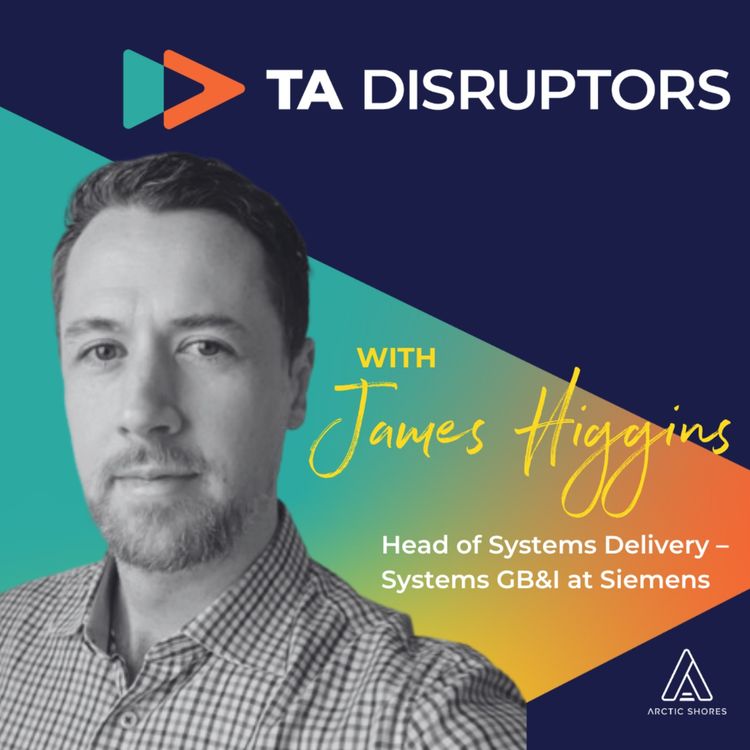
TA Disruptors
How Siemens EA implemented skills-based hiring – the hiring manager and candidate point of view on using CV-less hiring to solve the skills shortage, open up talent pools, and improve candidate experience
Have you been considering making the switch to skills-based hiring but feel terrified about trying to persuade your hiring managers to let go of experience-based hiring and stop using the CV as a comfort blanket?
Can you see roles where you’re facing a skills shortage or where candidates seem like a good fit on paper but are missing critical qualities in the interview stage?
Do you know that your candidate experience should be better, but need a hand convincing your stakeholders that CV-less hiring could be the key to sourcing exceptional talent who are MORE excited to work for you?
If you answered yes to any of the above, grab a coffee and your headphones.
This week, Robert is speaking to James Higgins, Head of Systems Delivery – Systems GB&I at Siemens Electrification & Automation, about his experience of being their first hiring manager outside Early Careers to pilot CV-less, skills-based hiring.
Robert also dives into a conversation with one of the first candidates Siemens EA hired through this process, Senior Project Engineer – Martin Hudson, to capture his reflections on what it was like to be part of a CV-less hiring process and why more businesses should embrace this approach.
In this episode, uncover insights like:
🚀 How Siemens EA formed an innovation squad featuring an executive stakeholder, a hiring manager, and their TA leaders to make the case for CV-less hiring and win people over –– and the pitch they made to turn people from sceptics to advocates
📈 How lowering the barrier to entry for candidates by removing the CV actually resulted in a 5X increase in application volume, an uplift in candidate quality, and a more diverse talent pool –– with the end result being 8 exceptional candidates shortlisted (3 hired) who never would have made it through the previous sifting process
🧠 How the Siemens EA team practically evolved their process –– from rethinking the core human traits and skills they really needed to select for to plug existing skill gaps, to rethinking how they advertised, to the role of the task-based psychometric assessment in uncovering candidate potential
💡The unexpected benefits of hiring candidates from alternative industries and talent pools that James and his team uncovered, why he’d have adopted CV-less hiring earlier if he could, and his views on hiring for attitude and behaviours vs skills, which specialisms can be taught vs which can be acquired, and which roles skills-based CV-less hiring can be used for
🤖 A candidate’s perspective on what a CV-less hiring process feels like, how task-based assessments create a value-add experience, and the power of offering feedback; how to adapt your interview process to ease anxiety and make candidates feel more motivated to work for you; and what candidates with no industry experience expect from the onboarding process
A big thank you to James and Martin for sharing their views with us.
Don’t forget to rate it and hit ‘subscribe’.
Download the The pragmatist’s playbook for skills-based hiring:
Sign up for the TA Disruptors newsletter:
Talent acquisition is changing faster than it ever has before. ChatGPT and other GenAI tools are literally turning the selection process on its head. This podcast is designed for disruptive Talent Acquisition leaders who want to get ahead. All brought to you from the team behind Arctic Shores.
More episodes
View all episodes
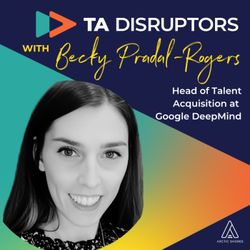
9. Behind the scenes: How Google DeepMind uses AI in recruitment | With Becky Pradal-Rogers
52:17||Season 4, Ep. 9AI is speeding up recruitment, but can it replace the human touch? Not quite.Becky Pradal-Rogers, Head of Talent Acquisition at Google DeepMind, knows what it takes to hire the right people in a world where top talent is rare, roles are evolving, and AI is changing the game. From using AI to map talent pools to piloting interviews where candidates use AI, Becky shares how her team balances efficiency, innovation, and the human insight that machines can’t replicate.Join Becky and Arctic Shores Co-Founder, Robert Newry as they unpack the future of talent acquisition, the wild card candidates you don’t want AI to miss, and why the recruiter’s instinct still rules.You’ll learn:⭐ How AI is flooding applications — and why top recruiters are mapping the market to find the best talent at the source🧠 Why AI can spot skills but not the “wild card” candidates who don’t fit the mould yet could be game-changers🌍 How human judgment and institutional knowledge uncover hidden talent and prevent cookie-cutter hires⚖️ Why responsible AI isn’t optional. Organisations must invest in training, due diligence, and oversight to stay compliant with regulations like the EU AI Act🤝 That AI should guide, not decide — keeping human insight at the heart of shortlisting and interviews💡 How Becky’s team flips the AI interview question, by asking candidates to use AI, showing real-world collaboration in action📊 How AI transforms recruitment data — consolidating sources, surfacing trends, and generating reports to help managers make faster, smarter decisions🎯 How investing time in AI learning and experimentation turns exploration into measurable impact ❤️ Why recruiters aren’t going anywhere. AI speeds up admin, but human connection still wins the hire!Whether you’re leading transformation or just trying to make sense of the noise, this episode is packed with insights to help you reset your approach for the AI era.Don’t forget to hit ‘subscribe’ to be sure not to miss more episodes of the TA Disruptors podcast. ________________________Thanks for listening, and here are some helpful links:Connect with Robert on LinkedIn:https://hubs.li/Q0282KjJ0 Connect with Becky on LinkedIn: https://www.linkedin.com/in/becky-pradal-rogers-8947625b/ Sign up for the TA Disruptors newsletter - it's the easiest way to be updated with the industry’s brightest ideas and the freshest need-to-know data - every week:https://hubs.li/Q0282H370 ________________________Talent acquisition is changing faster than it ever has before. ChatGPT and other GenAI tools are literally turning the selection process on its head. This podcast is designed for disruptive Talent Acquisition leaders who want to get ahead. For the innovators, the movers and shakers, and the TA leaders who will survive and thrive in this new era by moving quickly to future-proof their recruitment processes. Even when you’re feeling overworked and overwhelmed, we’ll help you keep up with the latest ideas from the industry’s brightest innovators and the freshest need-to-know data from new research. TA Disruptors has got you covered. All brought to you from the team behind Arctic Shores.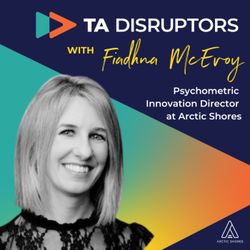
8. Why Learning Agility is a key capability for candidates in the AI era | With Fiadhna McEvoy
38:58||Season 4, Ep. 8Is AI forcing a total rethink of what we hire for — and how we measure it? If skills now “expire” in a couple of years, what signal should TA teams use at the top of the funnel to predict who will succeed when the job inevitably changes?Meet Fiadhna McEvoy C.Psychol, MCIPD, Psychometric Innovation Director at Arctic Shores — a business psychologist with nearly 20 years’ experience spanning occupational assessment, organisational development and psychometric innovation. At Arctic Shores, Fiadhna leads the design of task-based assessments built on cognitive science. And in this episode, she lifts the lid on a brand-new way to measure learning agility, the workplace capability everyone’s talking about.Join host Robert Newry and guest Fiadhna McEvoy as they discuss:💡 Learning agility, properly defined. Beyond buzzwords: how learning agility blends implicit learning from real-world cues, social dynamics, and comfort with uncertainty — and why it matters at every level, not just for leaders.⏱️ Why this matters now. With AI accelerating change, many technical skills have a shelf life of roughly two and a half years; analytical thinking remains a top priority, alongside resilience and influence, as noise increases and roles evolve.🧪 Show, don’t tell: a new task for learning agility. Traditional, text-based measures (self-report, SJTs, even some ability tests) are increasingly vulnerable to AI assistance. The new task-based approach captures primary behavioural evidence from thousands of micro-decisions — giving TA an explainable, AI-resilient signal at the front end of the process.🔍 Validated, not a black box. From theory to prototype to iterative testing, Fiadhna’s team focused on construct validity and real-world performance — including sharing their methodology at the BPS Division of Occupational Psychology and preparing a forthcoming paper.🚀 Early access in high-stakes hiring. What TA teams are seeing so far: a trading firm using learning agility alongside quantitative reasoning to shortlist at speed, and a global accounting firm applying it across Early Careers streams — with consistency from top-of-funnel through to assessment centre.⚖️ Pragmatism first. Why Arctic Shores is limiting the weighting during early access (so it informs rather than over-drives decisions) and how teams can adopt the signal responsibly while the high-stakes comparison group scales.Don’t forget to hit ‘subscribe’ to be sure not to miss more episodes of the TA Disruptors podcast. -------------------------------------------------Thanks for listening, and here are some helpful links:Connect with Robert on LinkedIn:https://hubs.li/Q0282KjJ0 Connect with Fiadhna on LinkedIn:https://www.linkedin.com/in/fiadhna-mcevoy-c-psychol-mcipd-a15a09a/Sign up for the TA Disruptors newsletter - it's the easiest way to be updated with the industry’s brightest ideas and the freshest need-to-know data - every week:https://hubs.li/Q0282H370 ________________________Talent acquisition is changing faster than it ever has before. ChatGPT and other GenAI tools are literally turning the selection process on its head. This podcast is designed for disruptive Talent Acquisition leaders who want to get ahead. For the innovators, the movers and shakers, and the TA leaders who will survive and thrive in this new era by moving quickly to future-proof their recruitment processes. Even when you’re feeling overworked and overwhelmed, we’ll help you keep up with the latest ideas from the industry’s brightest innovators and the freshest need-to-know data from new research. TA Disruptors has got you covered. All brought to you from the team behind Arctic Shores.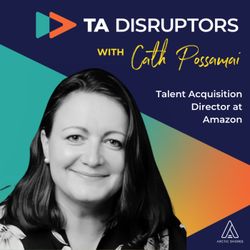
7. How Amazon are introducing automation and redefining candidate quality | With Cath Possamai
53:01||Season 4, Ep. 7Meet Cath Possamai, Amazon’s Talent Acquisition Director for EMEA, APJC and LATAM. With over 20 years in recruitment and talent management, Cath has worn almost every hat in the industry — from in-house roles to outsourced partnerships — across Financial Services, IT, Telco, BPO, and even Defence. She’s a champion of collaboration, believing that great business outcomes and exceptional candidate experiences go hand in hand. Now at Amazon, she’s shaping talent strategy across Europe, the Middle East, Africa, and Australia — making recruitment smarter, more human, and future-ready. And in this episode of the TA Disruptors podcast, Cath Possamai shares how she is reimagining recruitment at Amazon — blending human connection with AI, tackling talent disruption, and future-proofing the workforce. Sharing bold insights on entry-level roles, tech-driven efficiency, and why the next generation of talent depends on us getting it right.Listen as Cath and host Robery Newry dive in to discuss:🖊️ Rewriting recruitment rules: How and why Cath transformed British Army hiring with relatable role models and the bold “Snowflake” campaign, turning sensitivity and compassion into strengths.🧠 Why humans still matter: Even in an AI-driven world, Cath believes the recruiter expertise is irreplaceable — robots can’t match the human touch that drives quality hiring.🤝 How TA can focus on what counts: At Amazon, AI handles admin while recruiters concentrate on the “Seven Human Moments” that truly influence candidates’ decisions.🤖 How to experiment with AI — carefully: Hear why Cath encourages testing AI tools to learn what works, but stresses caution — errors or “hallucinations” are real risks.🚀 Future-proofing talent: Junior roles are critical. Today’s entry-level hires become tomorrow’s leaders, and AI can’t replace the need to grow talent pipelines responsibly.🌎 Shaping the workforce: Hear why Cath believes employers must actively partner with schools and universities to prepare students for tomorrow’s jobs, blending real-world skills with soft skills like adaptability and resilience.Cath's leadership lessons: Authenticity beats gravitas. Cath’s advice: empower your team, clarify your role, and trust people to own their work — you’ll get better results.Don’t forget to hit ‘subscribe’ to be sure not to miss more episodes of the TA Disruptors podcast. ________________________Thanks for listening, and here are some helpful links:Connect with Robert on LinkedIn:https://hubs.li/Q0282KjJ0 Connect with Cath on LinkedIn:https://www.linkedin.com/in/cathpossamai/ Sign up for the TA Disruptors newsletter - it's the easiest way to be updated with the industry’s brightest ideas and the freshest need-to-know data - every week: https://hubs.li/Q0282H370 ________________________Talent acquisition is changing faster than it ever has before. ChatGPT and other GenAI tools are literally turning the selection process on its head. This podcast is designed for disruptive Talent Acquisition leaders who want to get ahead. For the innovators, the movers and shakers, and the TA leaders who will survive and thrive in this new era by moving quickly to future-proof their recruitment processes. Even when you’re feeling overworked and overwhelmed, we’ll help you keep up with the latest ideas from the industry’s brightest innovators and the freshest need-to-know data from new research. TA Disruptors has got you covered. All brought to you from the team behind Arctic Shores.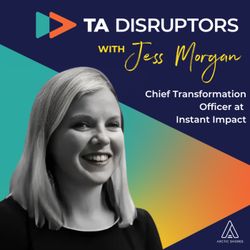
6. How to cope with 2,400 applications for one role | With Jess Morgan
48:34||Season 4, Ep. 6Applications are skyrocketing, AI is shaking up hiring, and recruiters are navigating uncharted waters. So how do talent acquisition teams harness AI without losing the human touch? And can teams really handle thousands of applications while keeping compliance and credibility intact?Meet Jessica Morgan, Chief Transformation Officer at Instant Impact and a technology transformation expert. Jess drives people-centric innovation in recruitment, optimising operations and building high-performing systems that empower both teams and clients to achieve scalable, sustainable results, and she’s here to unpack what really works — and what doesn’t.Join host Robert Newry and guest Jessica Morgan as they discuss:📈 How applications are exploding, and AI is fueling it: Some roles are pulling in thousands of candidates in hours. The trick? Redesign your systems to handle the flood without breaking.💻 Tech to the rescue—but don’t go rogue: AI can help sort, prioritise, and screen, but budgets and fairness still matter. It’s a tool, not a magic wand.📊 How strategy beats shiny toys: AI success isn’t about the tools—it’s about leadership, alignment, and clear principles. Without buy-in, even the best tech flops.🙌 Keeping humans in the loop: Auto-rejecting candidates? Big no. Compliance, credibility, and spotting hidden talent all hinge on human oversight.💡 Test, don’t blitz: Start small with AI trials. Check compliance, learn what works, and avoid patching together a “Frankenstein” process.🤖 How AI can actually enhance the candidate experience: From instant answers to 24/7 chatbots, AI can speed up the process and feed recruiters the insights to personalise experiences… when used wisely.Tune in to hear practical strategies, real-world examples, and expert insights on transforming recruitment for today’s fast-paced, tech-driven world.Don’t forget to hit ‘subscribe’ to be sure not to miss more episodes of the TA Disruptors podcast. Thanks for listening, and here are some helpful links:Connect with Robert on LinkedIn:https://hubs.li/Q0282KjJ0 Connect with Jessica on LinkedIn:https://www.linkedin.com/in/jessmorgan1/ Sign up for the TA Disruptors newsletter - it's the easiest way to be updated with the industry’s brightest ideas and the freshest need-to-know data - every week:https://hubs.li/Q0282H370 ________________________Talent acquisition is changing faster than it ever has before. ChatGPT and other GenAI tools are literally turning the selection process on its head. This podcast is designed for disruptive Talent Acquisition leaders who want to get ahead. For the innovators, the movers and shakers, and the TA leaders who will survive and thrive in this new era by moving quickly to future-proof their recruitment processes. Even when you’re feeling overworked and overwhelmed, we’ll help you keep up with the latest ideas from the industry’s brightest innovators and the freshest need-to-know data from new research. TA Disruptors has got you covered. All brought to you from the team behind Arctic Shores.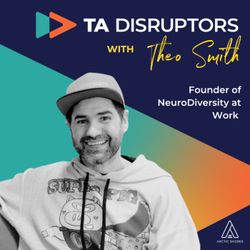
5. This is why inclusion efforts fall short for neurodivergent candidates | With Theo Smith
44:31||Season 4, Ep. 5Is AI making the workplace more inclusive – could it really be the silver bullet for Neurodiverse talent? And what should Talent Acquisition be doing to ensure that they’re not accidentally failing neurodiverse candidates?Meet Theo Smith, Neurodiversity Expert, Podcast Host, the founder of NeuroMind, a tech company, and NeuroDiversity at Work, a consultancy helping organisations create thriving, neuro-inclusive environments. With 15+ years in recruitment, talent, and diversity – he’s on a mission to drive innovation, performance, and productivity through neurodiversity.As a a LinkedIn Top Voice, award-winning author of Neurodiversity at Work, and host of the podcast Neurodiversity with Theo Smith, where he brings lived experience, practical strategies, and expert advice to the conversation – Theo is the perfect guest to dive in on this very special TA Disruptors podcast episode, giving TA the answers to the tough questions they’ve been debating in recent months.Join host Robert Newry and guest Theo Smith as they discuss:💡Why most neurodiversity initiatives flop: good intentions, zero structure, and managers left hanging - the key to good intentions lies in training, structure, or consistent support.🏥How Neurodiverse candidates often don’t need medical interventions—small, practical adjustments can make a huge difference..✅Tick-box inclusion? Why real progress means smashing systemic barriers, not just checking legal boxes.🤖How AI can be a game-changer for neurodiverse candidates… if you know how to use it.🏢Why interviews and onboarding can unintentionally disadvantage candidates; offering choice and flexibility helps people show their strengths and shine!⚡How combining technology, AI, and humans is the secret sauce. Support early creates a smoother, fairer path into work for neurodiverse talent, so they can both win. Don’t forget to hit ‘subscribe’ to be sure not to miss more episodes of the TA Disruptors podcast. -------------------------------------------------Thanks for listening, and here are some helpful links:Connect with Robert on LinkedIn:https://hubs.li/Q0282KjJ0 Connect with Theo on LinkedIn:https://www.linkedin.com/in/theosmithuk/?originalSubdomain=uk Sign up for the TA Disruptors newsletter - it's the easiest way to be updated with the industry’s brightest ideas and the freshest need-to-know data - every week:https://hubs.li/Q0282H370 ________________________Talent acquisition is changing faster than it ever has before. ChatGPT and other GenAI tools are literally turning the selection process on its head. This podcast is designed for disruptive Talent Acquisition leaders who want to get ahead. For the innovators, the movers and shakers, and the TA leaders who will survive and thrive in this new era by moving quickly to future-proof their recruitment processes. Even when you’re feeling overworked and overwhelmed, we’ll help you keep up with the latest ideas from the industry’s brightest innovators and the freshest need-to-know data from new research. TA Disruptors has got you covered. All brought to you from the team behind Arctic Shores.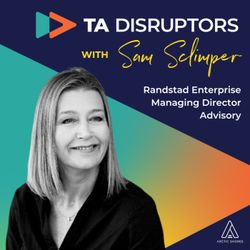
4. Strategic design: Randstad's new approach to performance, potential and diversity | Sam Schlimper
52:09||Season 4, Ep. 4AI is reshaping recruitment at every level. From graduate hiring to executive search. But while tools are evolving fast, the systems behind hiring haven’t kept pace.So how do you build a recruitment process that actually works in the age of AI?Meet Sam Schlimper, Randstad Enterprise Managing Director Advisory. With over two decades of experience leading talent strategy at global scale — from Barclays to Randstad — Sam brings a systems-thinking lens to the most urgent challenges facing TA leaders today.In this episode, Sam joins Arctic Shores Co-Founder Robert Newry to unpack how AI is changing the shape of work, and how TA can shift from a reactive function to a true strategic partner.You’ll learn:🤖 Why AI is eating entry-level roles – and what that means for emerging talent strategies in 2025 and beyond🧠 How Randstad are rethinking performance and potential – moving beyond CVs and interviews to build more inclusive, future-fit hiring processes🌍 Why candidate diversity starts with systems design, not just better sourcing or bias training⚙️ What it means to ‘redesign recruitment as work’ – with clear roles for humans, AI, and automation🐝 Why early careers talent are the 'scouts' of your organisation – and how neurodiverse thinkers can help you navigate complex, evolving challenges💥 How to win executive buy-in for change – using the language of business, not just HRWhether you’re leading transformation or just trying to make sense of the noise, this episode is packed with insights to help you reset your approach for the AI era.Don’t forget to hit ‘subscribe’ to be sure not to miss more episodes of the TA Disruptors podcast.-------------------------------------Thanks for listening, and here are some helpful links:Connect with Robert on LinkedIn:https://hubs.li/Q0282KjJ0Connect with Samantha on LinkedIn:https://www.linkedin.com/in/sam-schlimper-387861/Download our research on the state of the AI-enabled candidate in 2025: https://hubs.li/Q02W8w3J0Sign up for the TA Disruptors newsletter - it's the easiest way to be updated with the industry’s brightest ideas and the freshest need-to-know data - every week:https://hubs.li/Q0282H370________________________Talent acquisition is changing faster than it ever has before. ChatGPT and other GenAI tools are literally turning the selection process on its head. This podcast is designed for disruptive Talent Acquisition leaders who want to get ahead. For the innovators, the movers and shakers, and the TA leaders who will survive and thrive in this new era by moving quickly to future-proof their recruitment processes. Even when you’re feeling overworked and overwhelmed, we’ll help you keep up with the latest ideas from the industry’s brightest innovators and the freshest need-to-know data from new research. TA Disruptors has got you covered.All brought to you from the team behind Arctic Shores.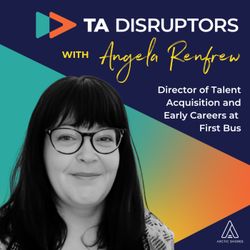
3. How to turn sceptical hiring managers into advocates (using data) | With Angela Renfrew
38:21||Season 4, Ep. 3Meet Angela Renfrew, Director of Talent Acquisition and Early Careers at First Bus — and a practitioner who’s proving that recruitment transformation doesn’t start with shiny tech. It starts with data, process, and winning over the toughest audience: hiring managers.In this episode of TA Disruptors, Angela shares the playbook she used to cut through scepticism, scrap outdated practices, and build a recruitment function ready for AI and automation. No fluff. Just hard-won lessons from the frontline.Join Angela as she discusses:📊 Data that wins debates: How simple dashboards turned sceptical hiring managers into advocates.🧩 One truth, not ten opinions: Why a single source of truth aligned the whole business.🚀 Reskilling for the AI age and how enablement and guardrails help recruiters thrive with new tech.⚙️ Automation that pays for itself — why the ATS was the first place to start.🗑️ The end of the CV and why task-based assessments now reveal potential over polish.Listen in for a masterclass in making change stick — even in the most complex organisations.________________________Remember to hit ‘subscribe’ to be sure not to miss more episodes of the TA Disruptors podcast.________________________Thanks for listening, and here are some helpful links:Connect with Robert on LinkedIn:https://hubs.li/Q0282KjJ0Connect with Angela on LinkedIn:https://www.linkedin.com/in/angela-renfrew-4b612445/Download our latest guide on how to choose the best automation for your hiring process: https://landing.arcticshores.com/how-to-choose-the-best-type-of-automation-for-your-processSign up for the TA Disruptors newsletter - it's the easiest way to be updated with the industry’s brightest ideas and the freshest need-to-know data - every week: https://hubs.li/Q0282H370________________________Talent acquisition is changing faster than it ever has before. ChatGPT and other GenAI tools are literally turning the selection process on its head. This podcast is designed for disruptive Talent Acquisition leaders who want to get ahead. For the innovators, the movers and shakers, and the TA leaders who will survive and thrive in this new era by moving quickly to future-proof their recruitment processes. Even when you’re feeling overworked and overwhelmed, we’ll help you keep up with the latest ideas from the industry’s brightest innovators and the freshest need-to-know data from new research. TA Disruptors has got you covered.All brought to you from the team behind Arctic Shores.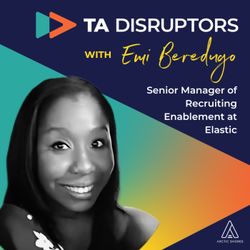
2. How to start thinking more strategically in TA | With Emi Beredugo
46:53||Season 4, Ep. 2AI is changing TA roles forever, but can this be a positive, especially as TA teams are being forced to do even more with less? Meet Emi Beredugo — a talent acquisition pro with over 18 years of experience helping companies find and hire great people. She's worked across the UK, Middle East, and Africa, leading teams and delivering some pretty complex recruiting projects along the way.These days, Emi’s the Senior Manager of Recruiting Enablement at Elastic, where she heads up a team dedicated to making the recruiting process smoother, smarter, and more inclusive. From AI tools and data to recruitment marketing and onboarding, Emi’s all about driving efficiency and creating a great experience for both candidates and recruiters. And she’s become an expert on AI and how it drives value for recruiting teams.Join host Robert Newry and guest Emi Beredugo as they discuss:🤖 How AI is reshaping the world of Talent Acquisition. And why Emi believes it's not about replacing recruiters but empowering them to focus on the human side of hiring.💡 How to successfully drive change in your organisation. From getting leadership buy-in to embracing failure as part of the learning process.🔍The risks of AI in hiring. From unconscious bias to data privacy, plus Emi’s advice on how TA pros can stay informed and responsible.📈 The growing role of Recruiting Enablement. And how leaders like Emi are helping teams work smarter with better tools, data, and decision-making.⚡ Why “doing more with less” is leaving little room for strategy. Plus, how TA teams can reclaim time to drive long-term impact.This episode is packed with insights and actionable learnings for talent acquisition leaders navigating the era of the AI-enabled candidate.Don’t forget to hit ‘subscribe’ to be sure not to miss more episodes of the TA Disruptors podcast. Thanks for listening, and here are some helpful links:Connect with Robert on LinkedIn:https://hubs.li/Q0282KjJ0 Connect with Emi on LinkedIn:https://www.linkedin.com/in/emi-beredugo-8295093/ Download new guidance on how to choose the best type of automation for your recruitment process: https://landing.arcticshores.com/how-to-choose-the-best-type-of-automation-for-your-process Sign up for the TA Disruptors newsletter - it's the easiest way to be updated with the industry’s brightest ideas and the freshest need-to-know data - every week:https://hubs.li/Q0282H370 ________________________Talent acquisition is changing faster than it ever has before. ChatGPT and other AI tools are turning the selection process on its head. This podcast is designed for disruptive Talent Acquisition leaders who want to get ahead. For the innovators, the movers and shakers, and the TA leaders who will survive and thrive in this new era by moving quickly to future-proof their recruitment processes. Even when you’re feeling overworked and overwhelmed, we’ll help you keep up with the latest ideas from the industry’s brightest innovators and the freshest need-to-know data from new research. TA Disruptors has got you covered. All brought to you from the team behind Arctic Shores.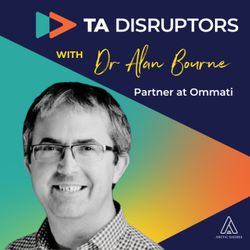
1. Standards, safeguards and snake oil: How to spot real value in AI hiring tools | With Alan Bourne
50:10||Season 4, Ep. 1Meet Alan Bourne, a trailblazer in talent assessment and organisational psychology, and someone with a refreshing take on the AI-driven challenges facing talent acquisition today. With a PhD in Organisational Psychology and Chartered Occupational Psychologist status, Alan brings deep expertise and bold thinking to this episode of the TA Disruptors podcast.He's also a big believer in the power of AI. Supporting early-stage firms building the next generation of talent tech. Alan’s style? Grounded, forward-thinking, and laser-focused on helping organisations turn assessment into a strategic advantage.Join host Robert Newry and guest Alan Bourne as they discuss:🤖 Why AI is shaking up candidate assessments. And how the growing gap between AI-savvy applicants and others is creating fairness and validity concerns in hiring.📈 What massive applicant volumes really mean for TA. And why average assessment scores may no longer tell us anything useful about candidate quality.🔍 How to balance candidate experience with trust and rigour. From the pros and cons of proctoring to the value of in-person final stages for key roles.🧠 The future of assessments: more real, less robotic. How new tech like language and visual AI is paving the way for dynamic, engaging, and harder-to-game evaluations.💡 Why we need to modernise buyer knowledge and how better-informed HR and TA professionals can make smarter decisions in the age of AI-driven tools.🎨 The challenge of assessing creativity and potential. And why AI might finally give us a way to evaluate the “hard to measure” skills that matter most.Don’t forget to hit ‘subscribe’ to be sure not to miss more episodes of the TA Disruptors podcast. Thanks for listening, and here are some helpful links:Connect with Robert on LinkedIn:https://hubs.li/Q0282KjJ0 Connect with Al on LinkedIn:https://www.linkedin.com/in/alan-bourne-5147883/ Download new guidance on how to choose the best type of automation for your recruitment process: https://landing.arcticshores.com/how-to-choose-the-best-type-of-automation-for-your-process Sign up for the TA Disruptors newsletter - it's the easiest way to be updated with the industry’s brightest ideas and the freshest need-to-know data - every week: https://hubs.li/Q0282H370 ________________________Talent acquisition is changing faster than it ever has before. ChatGPT and other GenAI tools are literally turning the selection process on its head. This podcast is designed for disruptive Talent Acquisition leaders who want to get ahead. For the innovators, the movers and shakers, and the TA leaders who will survive and thrive in this new era by moving quickly to future-proof their recruitment processes. Even when you’re feeling overworked and overwhelmed, we’ll help you keep up with the latest ideas from the industry’s brightest innovators and the freshest need-to-know data from new research. TA Disruptors has got you covered. All brought to you from the team behind Arctic Shores.